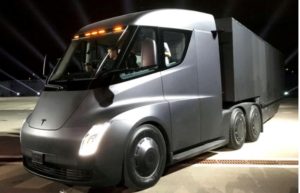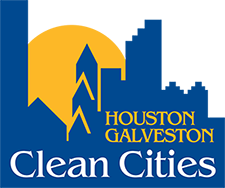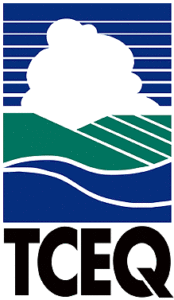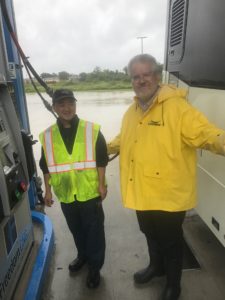 United Parcel Service said on Tuesday it is buying 125 Tesla all-electric semi-trucks, the largest order for the big rig so far, as the package delivery company expands its fleet of alternative-fuel vehicles.
United Parcel Service said on Tuesday it is buying 125 Tesla all-electric semi-trucks, the largest order for the big rig so far, as the package delivery company expands its fleet of alternative-fuel vehicles.
Tesla is trying to convince the trucking community it can build an affordable electric big rig with the range and cargo capacity to compete with relatively low-cost, time-tested diesel trucks. This is the largest public order of the big rig so far, Tesla said.
The Tesla trucks will cost around $200,000 each for a total order of about $25 million. UPS expects the semi-trucks, the big rigs that haul freight along America’s highways, will have a lower total cost of ownership than conventional vehicles, which run about $120,000.
Prior to UPS, the largest single pre-order came from PepsiCo Inc, for 100 trucks.
“As with any introductory technology for our fleet, we want to make sure it’s in a position to succeed,” Scott Phillippi, UPS senior director for automotive maintenance and engineering for international operations, told Reuters.
 Phillippi said the 125 trucks will allow UPS to conduct a proper test of their abilities. He said the company was still determining their routes, but the semis will “primarily be in the United States.” Tesla will provide consultation and support on charging infrastructure.
Phillippi said the 125 trucks will allow UPS to conduct a proper test of their abilities. He said the company was still determining their routes, but the semis will “primarily be in the United States.” Tesla will provide consultation and support on charging infrastructure.
“We have high expectations and are very optimistic that this will be a good product and it will have firm support from Tesla to make it work,” Phillippi said.
The UPS alternative fuel fleet already includes trucks propelled by electricity, natural gas, propane and other non-traditional fuels.
Source: Reuters

 The Texas Commission on Environmental Quality (TCEQ) is now accepting applications for the Texas Emissions Reduction Plan (TERP) Rebate Grants Program, a simplified first-come, first-served grant program to upgrade or replace on-road heavy-duty diesel vehicles and/or select non-road heavy-duty diesel equipment.
The Texas Commission on Environmental Quality (TCEQ) is now accepting applications for the Texas Emissions Reduction Plan (TERP) Rebate Grants Program, a simplified first-come, first-served grant program to upgrade or replace on-road heavy-duty diesel vehicles and/or select non-road heavy-duty diesel equipment. the Texas Commission on Environmental Quality to be the lead agency for purposes of Texas’ participation in the
the Texas Commission on Environmental Quality to be the lead agency for purposes of Texas’ participation in the  Thursday, December 14, 2017
Thursday, December 14, 2017
